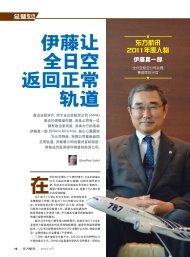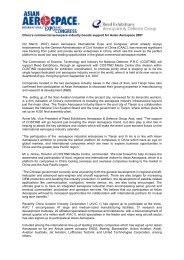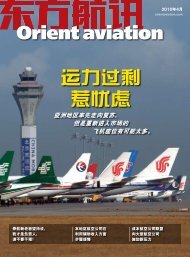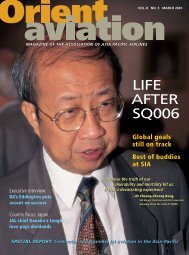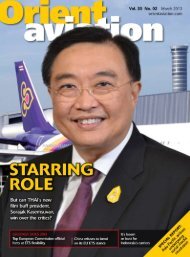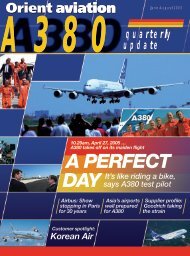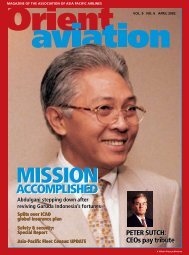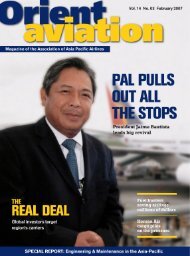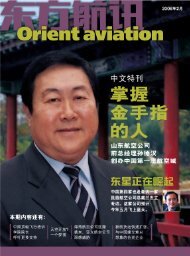You also want an ePaper? Increase the reach of your titles
YUMPU automatically turns print PDFs into web optimized ePapers that Google loves.
By Charles AndersonAway from the heavy duty talkson the future structure ofMacau’s passenger carryingoperations, Jacobus Hsieh andhis cargo team at <strong>Air</strong> Macauhave been quietly expanding their business inthe last couple of years and creating a successstory in their own right.Macau’s flag carrier, the only cargooperator headquartered in the enclave atpresent, increased the uplift of its freightersalone by a hefty 58% in 2005, topping 132,000tonnes for the year, compared to 83,600 in2004. That total neared 150,000 tonnes whenbelly cargo was taken into account.Forget the gambling and the tourismboom in the former Portuguese enclave. Thiswas all about tapping into the neighbouringPearl River Delta manufacturing zones andtaking advantage of Macau’sposition as a transit point tobeat the cross strait flight banbetween Taiwan and China.The way forward wassimple, said Hsieh, vicepresident, cargo. Increase fleetnumbers and play to Macau’sstrengths by boosting flightsfrom Taiwan to Shanghai,Shen zhen and Xiamen,with a touchdown at Macauto satisfy the Mainland andTaiwanese author ities.Much of Taiwan’s electronicmanufacturing has beenrelocated to mainland China,but there is good businessto be done carrying what is still madethere, such as LCD screens and critical partsof personal computers and cell phones.Operations for most of 2004 utilised justtwo wet-leased <strong>Air</strong>bus A300B4 freightersand an ageing Boeing 727. Another A300B4was added that November and two morearrived in August and October last year,when the B727 was retired.Now two longer-range dry-leased A300-600R conversions are on order, to arrive inFebruary and June next year and expansionoutside the China region, particularly to theIndian sub-continent, will be put on thedrawing board. “When they join our fleet,we will probably consider replacing twoexisting A300B4s, keeping a freighter fleettotal of five,” said Hsieh. Flights from Taipeito Shanghai Pudong via Macau, which onlybegan as a regular service in April 2004,Cargo no gamblefor <strong>Air</strong> MacauVolume soars 58% in 2005have increased from 11 a week to 16. Thoseto Shenzhen, launched in 2002, now total 10.Xiamen, which was added in June 2004, hasthree weekly flights. Service to Nanjing wasstarted and then stopped because of lack ofdemand.Shanghai is the big earner. Load factorsfrom Taipei to Pudong typically average90%, with those in the opposite direction<strong>Air</strong> Macau: between 35% and 40% of itscargo originates from the Peal River Deltatotalling 60%.A success story, no doubt. But isn’t therea danger of over-reliance on one sourceof business, which could disappear whencross-strait flights are eventually launchedand Taiwan’s cargo giants gain direct accessto mainland cities? Hsieh admits as much,but believes Macau’s geographical positionmeans business volumes can be kept up,whatever the political situation.As it is, some 35% to 40% of <strong>Air</strong> Macau’scargo comes from the Pearl River Delta itselfand is at less risk from a change of policy.Macau International <strong>Air</strong>port, meanwhile, isboosting its cargo warehouse total from itsoriginal design capacity of 160,000 tonnesto 300,000 tonnes as business from the deltacontinues to boom.“That will be a headache, that’s true,”Hsieh said, referring to direct flights. “Ourmajor business is providing a solution prior todirect service being implemented. Even then,I don’t think <strong>Air</strong> Macau will be out of thepicture. But the pie will be shared by manycompetitors, that is for certain.“Taiwan to Pudong will be easily replacedby the Taiwanese carriers. But if you lookat the location of Macau itself, we aremidway between Guangzhou, Taiwan andShenzhen. I don’t think <strong>Air</strong>Macau’s existing routes willbe affected much. Anyway,the Pearl Delta will becomemore important for us in thefuture.”T h a t m e a n s t a k i n ggoods manufactured thereon to other markets withint h e r e g ion, a n o bv iou smove for a carrier in <strong>Air</strong>Macau’s position and onethat is in the planning stage.But expansion into longerhaulservice has been puton hold because of currentfuel costs.“We’ll leave it for a yearor two. But when we replace the A300B4swith our own A300-600Rs, we will be ableto expand our business to places like India,Japan or Korea,” said Hsieh.The sub-continent is of particular interest,with Delhi, Chennai (Madras) and Dhakain Bangladesh the main targets. Potentialmarkets in Vietnam and Cambodia have beenstudied, but for India in particular, a longhaulpartner is needed because of the demandfor service on to Europe and the U.S.<strong>Air</strong> Macau can offer a feeder service,Hsieh believes, that could tie into someoneelse’s operations while the carrier can standalone for regional operations when the A300-600Rs arrive.Talks have been held with EVA <strong>Air</strong>,China <strong>Air</strong>lines, Thai <strong>Air</strong>ways Internationaland MASKargo, but no conclusions havebeen reached as yet.MAY 2006 ORIENT AVIATION 49



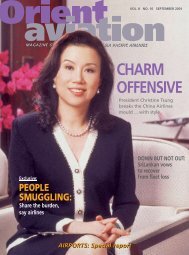
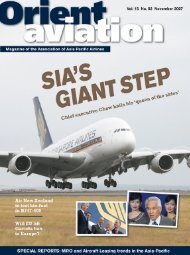
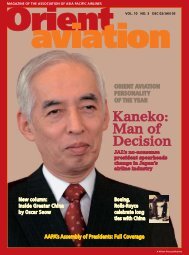
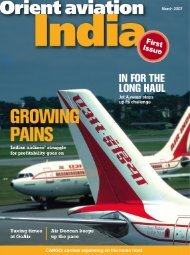
![OAMag-V7N4-Cover [Converted] - Orient Aviation](https://img.yumpu.com/48598575/1/190x255/oamag-v7n4-cover-converted-orient-aviation.jpg?quality=85)
